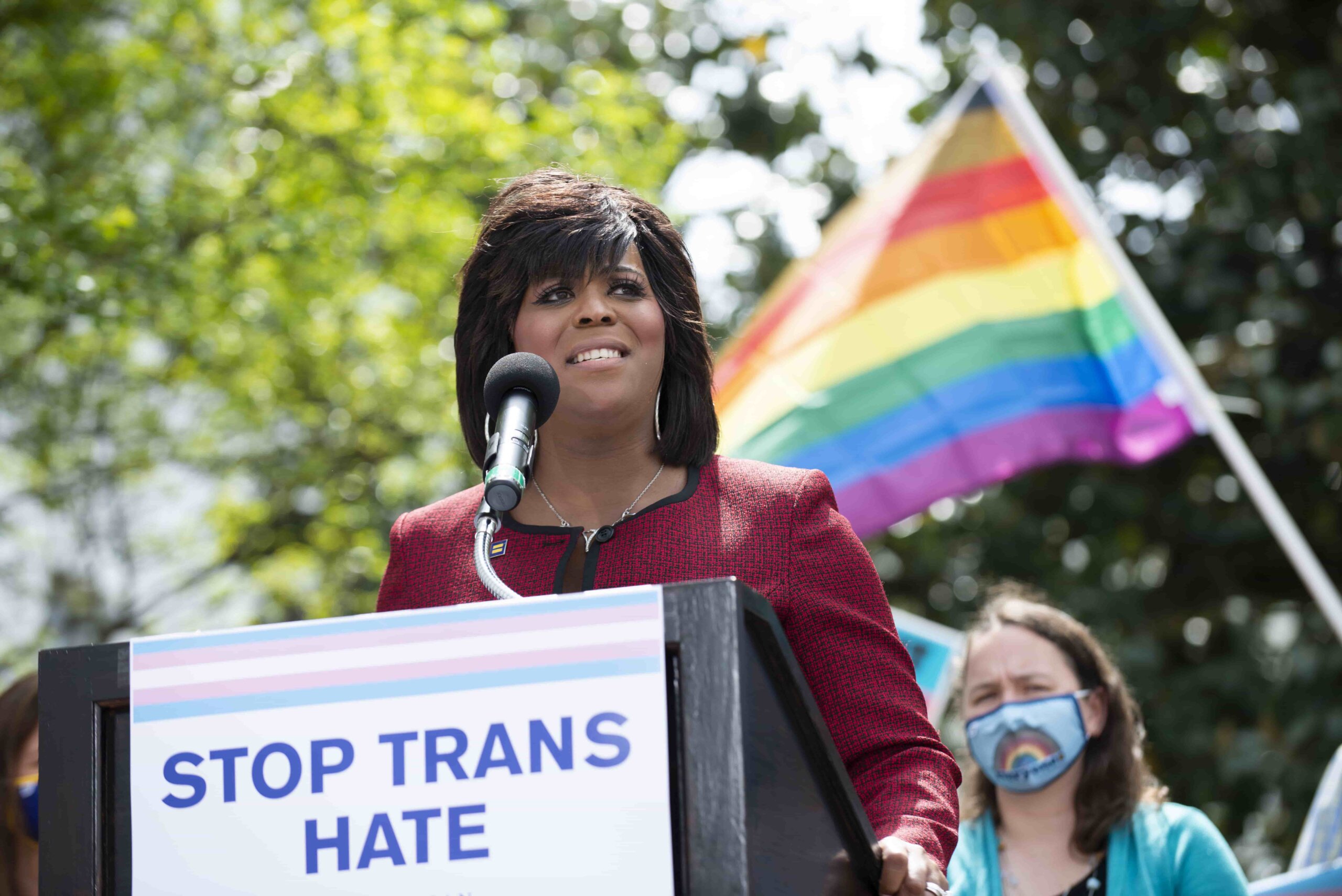Families of trans youth and doctors who provide gender-affirming care are suing the state of Alabama over an anti-trans bill recently signed into law.
The two lawsuits filed by the LGBTQ2S+ rights groups GLBTQ Legal Advocates and Defenders (GLAD), National Center for Lesbian Rights (NCLR) and the Human Rights Campaign (HRC) challenge Senate Bill 184, which criminalizes gender-affirming health care for youth under 19. Under the law, doctors face potential felony charges for treating trans youth with puberty blockers or hormone replacement therapy (HRT) and could spend up to 10 years in prison if convicted.
One of the lawsuits, which was filed on behalf of two families of trans teens and two medical professionals, says SB 184 will cause “irreparable harm” to trans youth if it is not overturned. It’s scheduled to become official policy on May 8.
“This is an unconstitutional bill that will cause enormous stress and harm to families,” says Asaf Orr, a senior staff attorney at NCLR, in a statement. “A federal court immediately stopped enforcement of a similar law in Arkansas last year, and we aim to obtain the same result here.”
Alabama Gov. Kay Ivey signed SB 184 into law a day after it passed the state legislature, making Alabama the third state to criminalize gender-affirming medical care after Tennessee and Arkansas, the latter of which was eventually blocked by a federal court. Ivey, a Republican, said in a statement that she believes “if the Good Lord made you a boy, you are a boy, and if he made you a girl, you are a girl.”
“We should especially protect our children from these radical, life-altering drugs and surgeries when they are at such a vulnerable stage in life,” she added.
“If this law goes into effect we may be forced to leave the state we call home in order to protect our daughter’s life.”
Morissa Ladinsky, a plaintiff in the lawsuit, says that SB 184 represents an “unprecedented level of legislative overreach into healthcare decision making.” As physicians at the Children’s Hospital of Alabama, she and co-plaintiff Hussein Abdul-Latif provide gender-affirming medical care to patients across Alabama and Mississippi, as well as the Florida panhandle. Youth in each of these states would immediately lose access to treatment if the law goes into effect.
The clinic currently has 200 active patients ranging in age from five to 20 years old, according to Ladinsky. Treatment varies by age groups and includes support for a social transition for young children, and the option of puberty blockers and hormone replacement therapy for older teenagers. Doctors discuss treatment at length with parents, who must give consent to gender-affirming care for their child.
“One of the biggest elements of misinformation relative to this health care bill, is that we are almost like a drive-by Jack in the Box for dispensing medication,” says Ladinsky, who is also an associate professor of pediatrics at the University of Alabama Birmingham. “Nothing could be farther from the truth.”
The other two plaintiffs in the lawsuit, which was filed on Monday, are anonymous parents of trans teens. Robert Roe, the father of a 13-year-old trans girl, says he wants his daughter to be “healthy and happy.” In a statement accompanying the suit, he claims that gender-affirming medical care has made a profound impact on his daughter’s life, noting that she went from “being reclusive and anxious to being an engaged, happy child” as a result of her treatment.
“This law threatens all of that and takes away our ability to follow the advice of highly qualified medical professionals,” he says. “I was born and raised in Alabama and came back here with my wife to raise our family. We love this community which has shown us incredible support. But if this law goes into effect we may be forced to leave the state we call home in order to protect our daughter’s life.”
The second lawsuit was filed on Tuesday by the American Civil Liberties Union (ACLU), Lambda Legal and the Transgender Law Center (TLC) on behalf of two families with trans teens. It claims the new law violates the Equal Protection Clause of the U.S. Constitution because it discriminates against trans youth.
“Even before I learned the word ‘transgender’ or met other trans people, I knew myself,” 15-year-old H.W., a plaintiff in the second lawsuit, says in a statement. “I did not choose to experience bullying and discrimination because I am transgender. I chose to be proud of who I am. The possibility of losing access to my medical care because of this law causes me deep anxiety. I would not feel like myself anymore if this life-saving medication was criminalized.”
Alabama could also face litigation over another recently signed law, HB 322, banning trans students from using bathroom facilities that align with their gender identity. The law also prohibits discussion of sexuality and gender in grades K-5, adopting language from Florida’s “Don’t Say Gay” bill. Nearly a dozen U.S. states have introduced legislation this year limiting LGBTQ2S+ education in schools.
Ladinsky is concerned about the message these bills send to trans kids after Alabama also enacted an anti-trans sports ban last year. “My stomach is seriously tied in knots most of the day because I am so afraid that either youth who are receiving care or youth who are hoping to might hurt themselves,” she says.
Update: April 18, 2022 3:26 pmAccording to the Montgomery Advertiser, the plaintiffs have withdrawn the two lawsuits.
Melody Eagan, an attorney representing two families and two physicians in one of the lawsuits, wrote in an email Monday that they planned to “file a new case in the immediate future” against SB 184. The law will take effect early May.


 Why you can trust Xtra
Why you can trust Xtra


